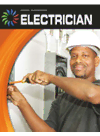
Electrician PDF
Preview Electrician
21st Century Skills Library CCCoooooolll CCCaaarrreeeeeerrrsss Michael TeiTelbauM Published in the United States of America by Cherry Lake Publishing, Ann Arbor, Michigan www.cherrylakepublishing.com Content Adviser Paul Rosenberg Credits Photos: Cover and page 1, ©iStockphoto.com/lisafx; page 4, ©iStockphoto.com/ wynnter; page 7, ©Shane White/Shutterstock, Inc.; page 8, ©iStockphoto.com/ briannolan; page 10, ©Enruta/Dreamstime.com; page 12, ©Monkeybusinessimages/ Dreamstime.com; page 17, ©Bill Bachmann/Alamy; page 18, ©Lisa F. Young/ Shutterstock, Inc.; page 20, ©Juice Images/Alamy; page 23, ©Razvanjp/Dreamstime. com; page 24, ©Gary718/Dreamstime.com; page 27, ©Lisafx/Dreamstime.com; page 28, ©Monkey Business Images/Shutterstock, Inc. Copyright ©2011 by Cherry Lake Publishing All rights reserved. No part of this book may be reproduced or utilized in any form or by any means without written permission from the publisher. Library of Congress Cataloging-in-Publication Data Teitelbaum, Michael. Electrician/by Michael Teitelbaum. p. cm.—(Cool careers) Includes bibliographical references and index. ISBN-13: 978-1-60279-936-3 (lib. bdg.) ISBN-10: 1-60279-936-9 (lib. bdg.) 1. Electrical engineering—Vocational guidance—Juvenile literature. 2. Electricians—Juvenile literature. I. Title. II. Series. TK159.T45 2010 621.3023—dc22 2010000686 Cherry Lake Publishing would like to acknowledge the work of The Partnership for 21st Century Skills. Please visit www.21stcenturyskills.org for more information. Printed in the United States of America Corporate Graphics Inc. July 2010 CLFA07 cool careerS elecTrIcIan y r a r b i l S l chapTer one l i a Power-full K S Idea y r u T n e i c T S 1 2 magine a world of darkness. A place where light comes only from fire and the sun. What kind of world Benjamin Franklin iiinnnvvveeennnttteeeddd tthhee llliiiggghhhtttnnniiinnnggg rroodd.. would that be? Actually, it’s the world that people lived in for most of human history. It’s the world before humans made use of electricity. Electricity has only been used during the past 100 to 150 years. Think of how important electricity has become in that time. We would not be able to light our homes and busi- nesses without it. We also need it to power the electronics we use every day. Computers, TVs, and air conditioners run on electricity. So do machines in hospitals. Don’t forget about equipment in factories. You can probably think of many more things that would not work without electricity. In June 1752, Benjamin Franklin flew a kite during a lightning storm. He hung a metal key from the kite’s string. Electricity traveled down the string when the kite was struck by lightning. This caused the key to spark. Franklin discovered that lightning was caused by electricity. He also realized that electricity could travel along power lines. One hundred years passed before scientists discovered how to turn electricity into light. Many scientists around the world helped with the invention of the lightbulb. Some included Joseph Swan in England and Thomas Edison in the United States. Edison’s idea for the lightbulb was a part of a larger plan. He invented a system that would create electricity. It would also deliver it to homes and businesses. People began cool careerS elecTrIcIan y r a r b li S l l using this system in the late 1880s. Since then, electricians i K S have had the job of setting up that system. They must also y r maintain it. u T Electricity travels along a path from where it is produced n e to where it is used. Electricians make sure the electricity c T moves safely at each step along that path. S 1 2 LLLEEEAAARRRNNNIIINNNGGG &&& IIINNNNNNOOOVVVAAATTTIIIOOONNN SSSKKKIIILLLLLLSSS Many people helped develop the lightbulb. The person most people remember is Thomas Edison. Edison wanted to bring light to homes, businesses, and streets. His thinking went beyond lightbulbs. He had the big picture in mind. He knew a system was needed to deliver electricity. Can you think of other inventors who kept the big picture in mind when creating their inventions? Some electricians work at the power plants where electricity is produced. Others work on power lines. These lines carry electricity from power plants to homes Electricians cccaaannn’’’ttt lllleeeetttt aa fear ooofff hheeiigghhttss gggeeettt iinn the way ooofff ddddooooiiiinnnngggg tttthhhheeeeiiiirrrr jjoobb!! cool careerS elecTrIcIan y r a r b li S l l and businesses. Some electricians work on the wires, outlets, i K S and switches inside buildings. y r Houses often lose electricity when power lines are u T knocked down during big storms. Electricians hurry to the n e scene. They fix the power lines and bring power back to c T buildings left in the dark. These electricians must often work S 1 outside during storms. They face the elements, such as wind, 2 Electricians know how serious a blackout can be. They work very hard to repair downed power lines.
